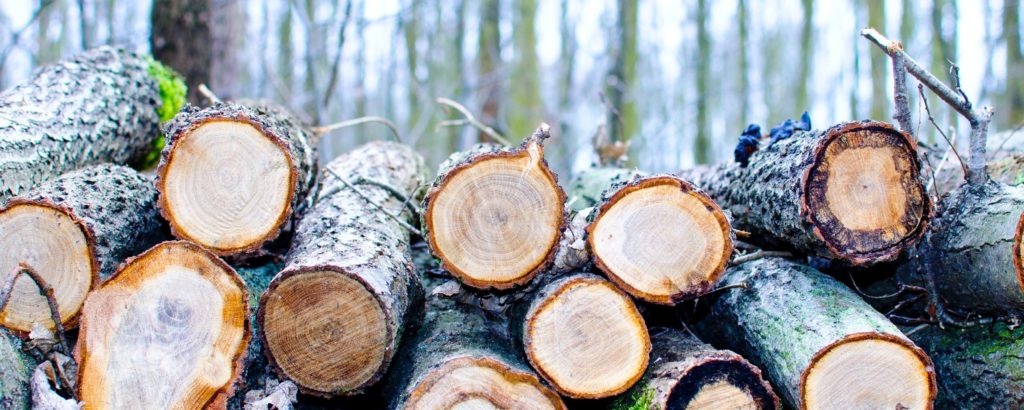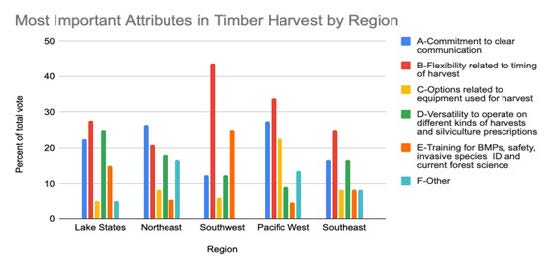Logger and forest manager surveys – beginning a dialogue of better understanding
Written by Colleen Robinson, as a compilation of published works. Photos by Dovetail Partners.
Noted in the introduction to a recent report on logger engagement and retention, forest management prescriptions based on ecological principles tend to be complex. Market-based approaches to promote ecological forestry, such as third-party certification programs, have helped expand the practice and adoption of a more holistic approach to forestry.
Logging businesses are critical to forestry and the forest products industry for implementing forest management prescriptions and delivering timber and fiber for manufacturing. Without loggers, foresters and landowners cannot accomplish their land management objectives. Logging businesses change over time and are adapted to local conditions. The challenges faced by logging businesses can be mitigated by preparing timber sales that consider local logging system capabilities and constraints, and through knowledge transfer and innovation among logging businesses. These challenges and the solutions are a topic of concern in the forestry community, as the success of ecological forestry is dependent on a good plan executed on the ground by a quality logging operation.
Dovetail Partners, a Minnesota-based non-profit organization, partnered with the Guild to conduct a survey of the professional Guild members located throughout the United States regarding the importance of quality logging operations and their understanding of the challenges facing the logging industry. The survey was specifically designed to capture the perspectives of foresters who typically practice ecologically based forestry, thus the Guild provided a natural partner for the survey. This report highlights the results of the survey, follow-up interviews that were conducted, and related literature.
 A key focus of the survey and report was quality logging operations (QLOs). In the report, we defined quality logging operations (QLOs) as timber harvests that meet the following three criteria:
A key focus of the survey and report was quality logging operations (QLOs). In the report, we defined quality logging operations (QLOs) as timber harvests that meet the following three criteria:
- The harvest is executed in a manner that minimizes the negative environmental externalities that can occur during a harvest.
- The loggers and landowners have communicated and developed a plan for what the harvest will look like.
- A QLO maximizes the utility of the logger and landowner given the constraints they face (environmental, capital, third party and legal restrictions).
 The expanded attention to characteristics of quality logging operations can create barriers between harvesters and forest managers. For QLOs to persist for decades to come, a dialogue between timber harvesters and forest managers is necessary. This report’s larger purpose is to support a dialogue between these groups to bolster recruitment of QLOs and limit attrition of those capable of performing quality logging operations.
The expanded attention to characteristics of quality logging operations can create barriers between harvesters and forest managers. For QLOs to persist for decades to come, a dialogue between timber harvesters and forest managers is necessary. This report’s larger purpose is to support a dialogue between these groups to bolster recruitment of QLOs and limit attrition of those capable of performing quality logging operations.
This recent survey’s results, illustrating ecological forestry professionals’ understanding of logging industry successes and challenges amid the need for ecologically minded forest management and forest operations is just part of that larger dialogue. Previous surveys of the logging community have been conducted over time by others and show alignment with many of the concerns raised by foresters in our survey. For example,
- “Finding skilled workers was identified as the greatest barrier to success by the respondents, underscoring the need for more training opportunities.” Vaughan et al. 2022 Forest Contracting Businesses in the US Southwest: Current Profile and Workforce Training Needs. J. For. 120, 186–197.
- In the Lake States, survey data from 2003 and 2010 were analyzed in Rickenbach et al 2015. Wisconsin’s Logging Sector: Status and Future Direction. UWEX Cooperative Extension G4073, Madison, WI. Some implications mentioned include that “The logging sector has lost business but continues to be able to supply wood to mills because businesses have gotten bigger. This trend is likely to continue, but barriers exist. Further analysis and policy changes will likely be needed to ensure adequate logging capacity in the future.” “…Opportunities to gain technical skills are available but can be difficult to access or pay for. Moreover, the capital required to enter the business provides a barrier to entry and a challenge to existing businesses looking to expand.”
- New England states found similar sentiments according to Egan, A., 2011. Characteristics of and Challenges Faced by Logging Business Owners in Southern New England. North. J. Appl. For. 28, 180–185. “A mailed survey, informed by focus groups, key informant interviews, and previous research, was used to develop baseline information about the region’s logging business owners and to explore challenges to the region’s logging businesses.” “Logging business owners cited several challenges to maintaining or expanding their businesses, including day-to-day operating costs, equipment and insurance costs, the price of stumpage, a shrinking forestland base, and harvest regulations. In addition, there was a general perception of the public’s lack of respect for loggers and logging, as well as a perceived disconnect between forest products that the public consumes and the work that loggers perform. Loggers in the region appeared to have less familial attachment to logging, more non-logging employment opportunity, and a diminished sense of occupational prestige compared with other logging business owners in the northeast.”
- The Southeast survey analysis echos the concerns in Spong et al. 2010. Characteristics of West Virginia loggers during economically difficult times. USDA Forest Service, GTR- NRS-P-78 “Unfortunately, increasing logging rates and certification programs have not been enough to save a large number of employees in the logging workforce from losing their jobs. Twenty-five percent of loggers responded that they laid off more than half of their employees.” “Another difficulty loggers face is the requirement to make workers’ compensation payments. West Virginia privatized its workers’ compensation insurance system in 2006, creating an opportunity for new programs and potential savings to the logging business. However, this potential savings has not yet arrived for most loggers…”
The Guild and Dovetail’s report along with other similar research highlight the challenges facing loggers, and hence foresters’ ability to implement ecologically sound management.”
